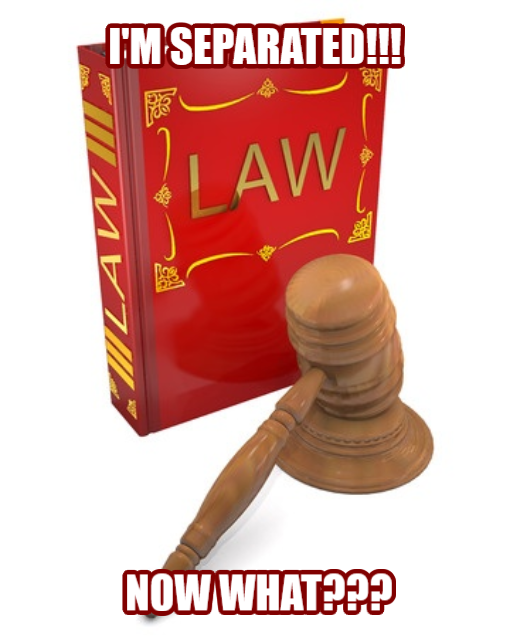
I’m Separated, what should I do now?

It is recommended that the first thing that you do once your relationship has broken down is to see a lawyer, just so that you know where you stand and to ensure that you know what you are up for. Some of what is written below may apply to you, but you will need advice specific to your situation.
Knowing your rights prevents you from being bullied into accepting less that what you are entitled to or that you deserve. This is especially true for stay at home mums, who have perhaps not financially contributed to the purchase of the home, but who have raised the kids. Some men believe that they should get everything because they paid for it. This is not true, all contributions, financial and non-financial are taken into account.
You may already know a lawyer, but if you don’t you can refer to the Law Institute or society in your State which will have a list of family lawyers in your area. Many offer a free referral service where the first 30 minutes of your consultation is free.
A word of caution in whatever you decide to do – be careful not to go too far- that is beyond what is required. If you act out of spite or rush off and make unnecessary court applications or stop certain financial transactions, it will exacerbate the situation, and your ex is likely to counter your move. You will both be running on high emotions. This can lead of enormous legal costs, alienation of certain friends or family members. And it is important to remember that if you have children with your ex, you will need to co-operate with one another until your children are grown. This is not to say that you should keep the peace at any price, just that you should consider your actions carefully, otherwise it may cost you.
Children
If you have children together, both parents are required to support the children in proportion to their earnings. If you can agree between you as to the amount of child support that will be paid, all the better.
You could refer to the Child Support Agency to ascertain what would be payable in your situation. However, you can negotiate higher children support, especially as this will be for the benefit of your child.
If you cannot agree on child support the child support agency can be used to broker an arrangement on your behalf, and even collect the child support for you.
If you can agree between yourselves, you could formalise your agreement in a Binding Child Support Agreement. You will need the assistance of a lawyer to draft such an agreement. Be sure to include an adjustment clause for inflation and unforeseen costs, such as medical expenses.
The next issue relating to children is custody and visitation, though the court prefers to refer to this as ‘time spent with’. You can decide between yourselves your own child care arrangements. You do not need to put it in writing, but you can obtain parenting orders from the federal court which will formalise your agreement, or decide for you if you cannot reach an agreement yourself. As the children get older these arrangements may change if it is in the best interests of the child.
Each parent has a responsibility towards their child and must support and encourage the child’s relationship with the other parent. If you try to turn the child against the non-custodial parent, it could be seen that you are not acting in the child’s best interest and the court could award custody to the other parent, if appropriate after all things are considered.
You should also not disparage the other parent in front of the child. Failure to do so could reflect badly on your suitability as a custodial parent. This requirement is often included in the Court’s orders.
If your ex is violent or otherwise unsuited to spending time with the child, supervised visits may be arranged if appropriate. You will need to convince a court that this is in your child’s best interests.
If need be, you should notify your child’s school of custody arrangements, particularly if access is restricted.
Finances
If you are unable to support yourself, you can apply to court for spousal maintenance. You could also make an agreement with your ex-partner, which should be put into writing. You will need to see a lawyer to ensure that you have met all the requirements for a binding agreement.
Prevention of waste – if your ex-partner squanders a lot of the joint resources, even if they are in his or her name, this wastage could be taken into account in the final property division for the sake of fairness as an asset that they have already received.
House
It is possible to be separated under the same roof, that is you live separate lives but both stay in the same house usually for financial reasons. You would be separated in the same way as if you lived separately.
Do you need to change the locks once your ex moves out? You can. They are not entitled to come and go as they please.
While you are at it, it would be best to change names on all household accounts if they are solely for your benefit or to remove liability to yourself with respect to you ex’ accounts.
If the joint property is registered in your ex-partner name you may wish to lodge a caveat on property title to secure your interest. This means that there can be no dealings with the property, such as a sale or mortgage without your consent pending the final division of assets.
Super
You may wish to notify your ex’ Super that the Super fund is the subject of an ongoing family law matter and therefore they should not distribute to your ex.
If you have funds in Super, once you are separated you may wish to consider redrafting your Binding Death Benefit Nomination to exclude your ex-partner if you so desired.
Other assets
The protection of business assets is a tricky area. If you believe that your ex is mismanaging the business you will need to take action quickly. This is one of the instances where you will definitely need a lawyer. You may need to apply for the appointment of an administrator for the business.
It is possible that you ex enters into a new relationship and you will then need to consider if it is necessary to protect the assets from a claim by a new de facto of your ex. This will usually only become relevant after their relationship has been going on for 2 years or more, though there are exceptions. The defacto relationship could have started before you separated. To protect yourself in these circumstances you should obtain a property settlement for yourself as soon as possible.
Going to Court
If you need to go to Court, be it for Parenting Orders or Property Orders, you are best advised to seek legal advice preferably from a family lawyer. Of course you can represent yourself, but any mistake made may be harder and more expensive to correct afterwards. Even if you just get advice to ensure that you have done things properly and have taken care of your rights.
When choosing a lawyer, choose wisely, ask for costs up front, maybe shop around. Pick one who has a big picture view of the matter, who will take into account that you have to live with the outcome, and that your children will live with the consequences as well. Choose one who will consider your goals rather than doing what they think is best.
If a court application has been made don’t ignore it. Go to court on the assigned dates and file all documents that need to be filed at court. Ignoring it will not make it go away. The court will simply decide in your absence.
You can decide if you will have your arrangement formalised, if you and your ex can agree, either through Consent Orders or a Binding Financial Agreement. Consent Order consist of an agreement that you both sign and submit to court for approval. The court looks at all the assets and contributions of both parties and will only grant the Consent Order if the agreement is fair.
A Binding Financial Agreement is one that requires the assistance of a lawyer, as there are certain formalities that must be adhered to. If you do not get the proper legal advice, the agreement will not be binding.
You will need to have at least 1 year of separation before you can apply for a divorce. You will need to have your property division Orders or Agreement in place within one year of your divorce. You can obtain orders before you get a divorce or after.
If there is a history of domestic violence, you should notify the Court so that they can tend to your personal safety.
Moving on
Once you have separated it is advisable that you don’t rush into a new relationship as this may add an unnecessary complication to an already difficult situation, particularly the impact that it may have on your children, or the possibility that you could be entering into a defacto relationship which could have financial consequences. A new partner in the equation tends to cause the other party to overreact emotionally.
Now that things have changed it is time to think about drafting a new will. Depending on where you live, your Will may be invalidated once you divorce, and it is a good idea to take care of all the loose ends.
Image: Copyright:
fkdkondmi 123RF Stock Photo